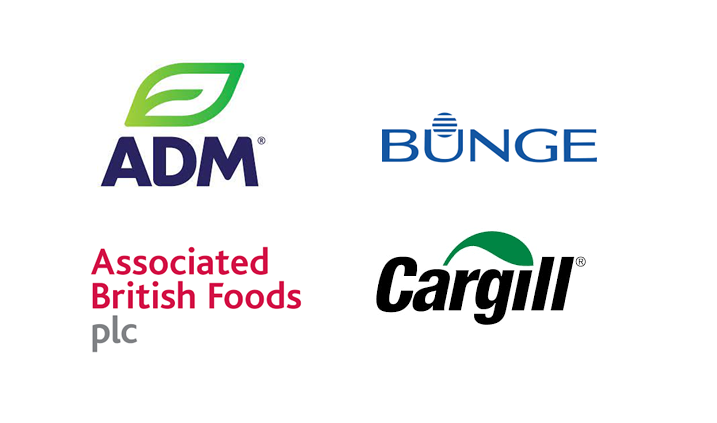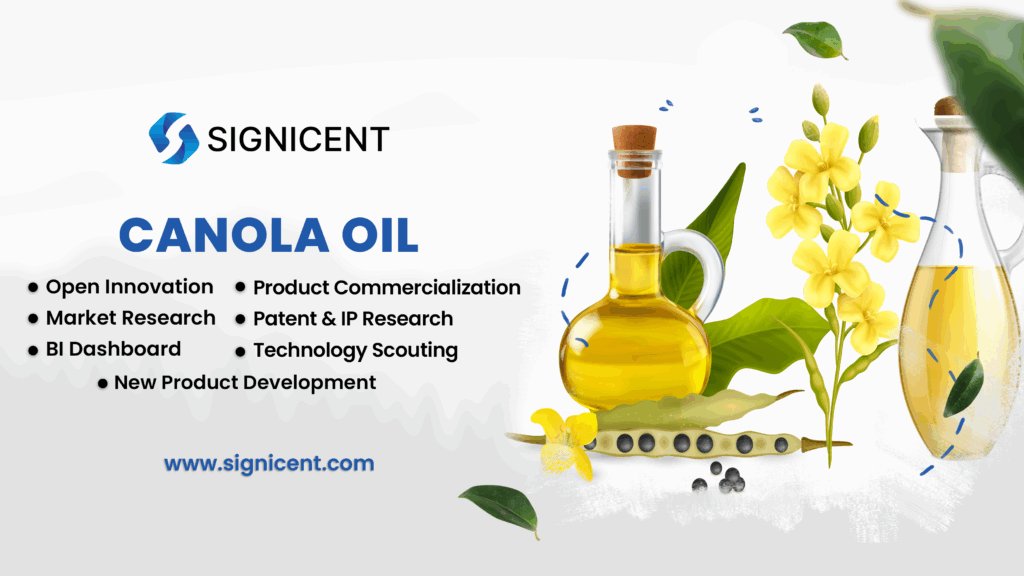The objective of the report is to identify the research, development and innovations in the field of Canola oil. The report shows a comprehensive analysis of technologies that include:
- The details of innovations surrounding the composition, production, and processing of canola oil.
- Information of academic institutes working on technology advancements.
- Various competitors, suppliers, and key players in the field of vegetable oils broadly will also be provided.
Reports highlight that palm oil, widely used around the world, poses health hazards. People are looking for alternatives and shifting to rapeseed oil, canola oil and olive oil.
Many consider canola oil the best option out of all alternatives. It has the lowest level of saturated fat and is rich in monounsaturated fats and omega-3 fatty acids. This makes it healthy for the heart and perfect for cooking even at high temperatures.
Challenges related to Canola Oil
Canola oil is becoming more and more popular as a cooking oil due to its health benefits. This healthier option provides some delicious recipes but not without its challenges.
- Canola oil when deodorized to temperatures above 200ºC and exposed to high temperatures can lead to the conversion of unsaturated fatty acids, especially the essential ω-6-linoleic and ω-3–linolenic acid to trans-fatty acid isomers.
- Transformation of some of the natural unsaturated fatty acids to trans-fat during the deodorization step leads to a reduction in the content of beneficial ω-3–fatty acids.
- The majority of canola is chemically extracted by using a solvent called hexane, and heat is often applied, which can affect the oil’s stability causing it to turn rancid, destroy its omega-3s, and even create trans fats.
- This oil can cause inflammation and calcification of arteries and enhance the risk factors for coronary heart disease. The erucic acid in canola oil is harmful and may cause retardation of normal growth.
Innovations for longer Shelf Life
The good news is that there are solutions to these challenges. The following innovative solutions make rapeseed oil more nutritious and provide a longer shelf life and high oil yield.
Preparation of Canola Oil with Low Erucic Acid
Manufacturers use the cold pressing method to increase the shelf life of canola oil. The process decreases the content of erucic acid to ultra-low level. The technique is simple and provides a high oil yield and the final product obtained has good color and luster with more nutritional ingredients.
Aqueous extraction by Megasonic-assisted method
Researchers consider megasonic-assisted aqueous-based extraction of oil an alternative to conventional hexane extraction. The aqueous-based recovery of canola oil from canola cake achieved 50% oil extractability using a megasonic intervention.
Expeller extraction method
Developers have improved the canola oil expeller extraction method by using a pilot-scale continuous flow microwave system to pre-treat seeds and flaked seeds.
The yield of oil extracted from flaked and continuous flow microwave-pretreated canola seeds on the expeller is increased. Moreover, it shortens the heating period compared with steam pre-treatments, at similar specific energy consumption.
Rapeseed oil stability
Rapeseed Oil Press with stable improvements is incorporated to increase the yield of rapeseed oil. The model comprises a bottom plate, a shell, an oil press and a bran doping device. Wherein the shell is installed on the upper-end face of the bottom plate, the oil press is installed inside the shell, and the bran doping device is installed at the left end of the upper-end face of the shell. This will not only improve the yield but also make rapeseed oil yield stable since it absorbs the temperature of the rapeseed.
Gene-based methods
The gene-based technology protects valuable canola crops from frost. Green seeds in the highest quality of canola cannot exceed 2%, however, frost increases this percentage. When green seeds are processed to extract rapeseed oil, chlorophyll degrades the quality and storability of the oil. The up-regulation of ABI3 (Abscisic Acid Insensitive 3) in seed tissue improves the degreening system of the seed and permits the seed to degrade chlorophyll after exposure to frost.
Market
The global market of Canola Oil is expected to grow at a CAGR of 6.00 % during the forecast period. The global market size was valued at USD 30.85 million in 2021 and is anticipated to reach up to USD 52.11 million by 2030.
Market Segmentation
This section of the report talks about various segments based on different factors of the canola oil.
- Based on the use: Cooking, Processed Foods, Lubricants, Personnel Care, Biofuels and others.
- Based on the packaging: Cans, Drums, Bottles, Pouches and others.
Collaboration & Acquisition
Richardson International Limited & Wesson
Richardson International Ltd. has acquired Wesson, a U.S. retailer brand of canola, corn and vegetable cooking oils, following satisfaction of all regulatory and other closing requirements. It has acquired the Wesson production facility in Memphis, Tennessee to strengthen its footprint in the country and extend its activities for processing oilseeds.
Federated Co-operatives Limited (FCL) with AGT Food and Ingredients
Federated Co-operative Limited (FCL) has signed an agreement to form a joint venture (JV) relationship with AGT Food and Ingredients Inc. (AGT Foods). FCL is making $2 billion investment in the canola crush plant for the construction of an Integrated Agriculture Complex (IAC). The IAC will include the recently announced renewable diesel plant and canola crushing plant that will produce feedstock for the plant-based fuels produced at the renewable diesel facility.
Key Players of post-harvest treatment
This section of the report enlists some of the major players working in the market.

Recent Report
- GCCs in Asia: Powering the Next Era of Global Digital and Biotech Innovation
- How Today’s Lipstick Formulations Deliver Comfort, Color & Clean Beauty
- How EU Regulations Shape Product Safety, Sustainability and Business Compliance
- Transparent Solar Panels Powering Smart and Green Cities
- Future of Cooking with Nanotechnology: How Smart Kitchen Technology Is Transforming Modern Kitchens


